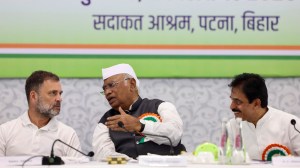After guns, it’s not roses all the way for surrendered Naxalites
HYDERABAD, July 3: A cash-strapped Andhra Pradesh Government is now struggling to keep its ambitious Naxalite rehabilitation programme on th...

HYDERABAD, July 3: A cash-strapped Andhra Pradesh Government is now struggling to keep its ambitious Naxalite rehabilitation programme on the right track. The scheme launched to help surrendered PWG members is petering out, with the Government finding it difficult to mobilise funds even for granting loans.
The fact that many of the reformed extremists could not make effective use of the funds provided allegedly due to the lack of business acumen hasn’t helped matters either. Cooperative banks actually suffered losses as a result of extending loans to the Naxalites as many of the ultras preferred to go back underground than repay the loans.
Faced with such innumerable problems, the Government decided to slow down the scheme. Naturally, this has hit the extremists who surrendered recently the most. Says Yashoda, who along with her husband Janna Reddy gave up Naxalite activity in 1996, “We applied for a loan to purchase a tractor soon after surrendering to the police. Since then I have been makingrounds of the office of the superintendent of police, without any success.”
The couple, who are now staying at their ancestral house in Tummanapalli in Karimnagar district, have lost all hopes of getting the loan and are looking for alternate means of livelihood.
Theirs’ is not an isolated case. With the implementation of the scheme becoming more and more tardy with every passing year, the number of beneficiaries are also going down. In fact, for over an year, no loans have been extended.
This, say sources, is rather a sad anti-climax to the rehabilitation programme, which was introduced in 1989 and which worked quite well in the initial periods, thanks to the initiative taken by some collectors and superintendents of police of the north Telangana districts.
Warangal SP R P Thakur admits that loans have not been sanctioned for the past 10 months for various reasons including financial constraints. According to him, there is no point in extending help to everyone. “The very aim of the programme willbe defeated if it is extended to militants too. There will be a queue at my office and after enjoying the benefits they will go and join the party again,” he said.
According to available statistics, as many as 500 hard-core Naxalites, besides 15,000 militants, have surrendered since 1985.
The rehabilitation package is, however, limited to PWG squad members and senior functionaries. Besides, getting a loan under the rehabilitation programme is not easy. A committee comprising the district collector, SP and other officials concerned decide whether to grant he loan or not. As many as 80 applications are pending in Warangal, while an equal number await clearance in the remaining Telangana districts.
As a result, many surrendered extremists are struggling to make both ends meet. Like Sadanandam of Huzurabad in Karimnagar district, a former commander of three armed squads of the PWG, who surrendered in 1986. After serving sentences for three years, he opened a garment shop with financial assistance from theAndhra Bank. A novice in business, he suffered losses and is now finding it difficult to provide for his family, leave alone repaying the loan.
The case of K Venkat Reddy, who surrendered in 1987 after 12 years of underground life, is no different. He decided to join the mainstream following problems in his party but was in jail for an year after his surrender and faced trial in 14 cases. Says he, “Just giving some loan cannot be called rehabilitation. The government should drop all cases and give the surrendered Naxalites an opportunity to lead a normal life.”
“We initiated the process of persuading surrendered extremists to repay the loans. Some have given undertakings that they would pay back next year,” says Warangal DCCB chairman Donti Madhava Reddy. But with several of them having gone underground once again and many others selling off their vehicles and other equipment, their undertakings seem dubious. So much so that the State Bank of Hyderabad sought the help of the Warangal district policein recovering loans from 100-odd beneficiaries.
Photos


- 01
- 02
- 03
- 04
- 05





























